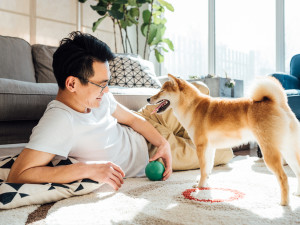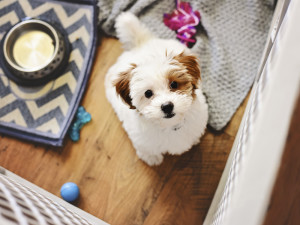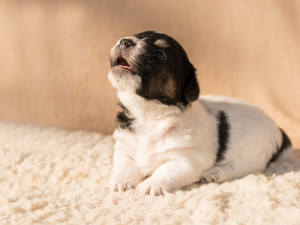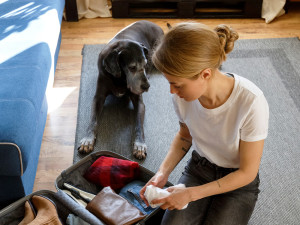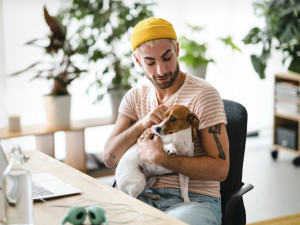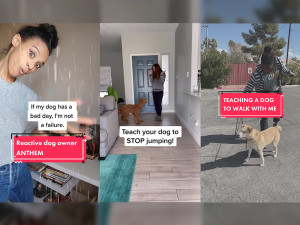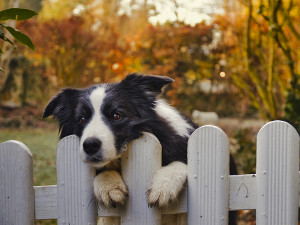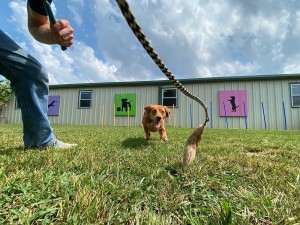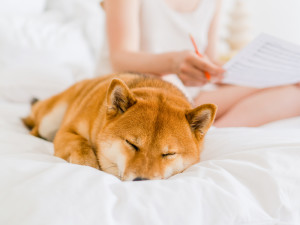Leaving Your Dog Home Alone? Here’s How to Handle the Guilt
Leaving your dog alone at home can be guilt-inducing... but it doesn’t have to be
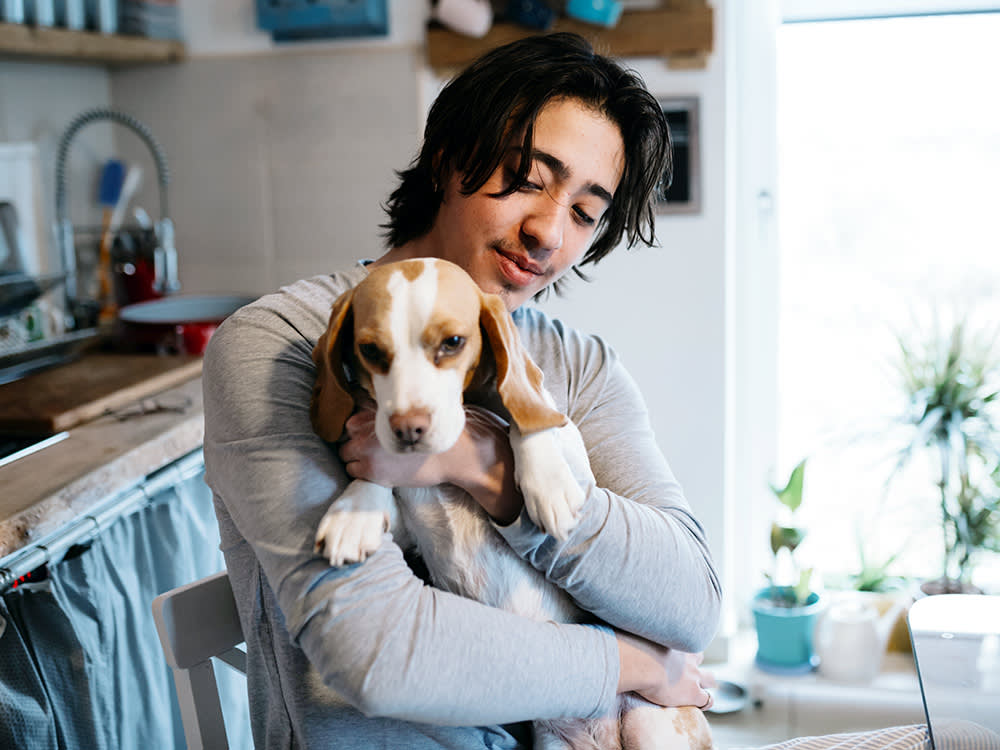
share article
Like every new dog owner, I am besotted with my seven-month-old puppyopens in a new tab, Mona. I love everything about her, even the fact she can’t stop licking my inner ear when given the chance.
But I do miss the small mundane freedoms of pre-pet life. With my dog along for the ride, a lot of life’s basics have become more complicated: going food shopping when out on a walk; heading to an impromptu drink with friends; making decisions based on what I feel like doing, not how close we are to a certain someone’s nap timeopens in a new tab.
Many places are dog-friendly in the UKopens in a new tab. But many aren’t, so considerable planning has to go into everything. And even if every place I wanted to go was dog-friendly, that doesn’t mean I’d always want to take her with me. That could be for her benefit (it would be too overwhelming), but sometimes, I admit, it’s for mine.
Leaving your dog alone at homeopens in a new tab is a guilt-inducing, scary prospect, to the point that you might choose to cancel plans rather than leave them behind. What if it makes them anxiousopens in a new tab? What if they destroy things? How long is too long alone?
But we’re here to say that you don’t need to cancel. Not only should you make time for your social life and mental well-being, but there are ways to leave your dog home alone safely and securely.
We spoke to Ingrid Haskalopens in a new tab, a professional registered Clinical Animal Behaviourist, to understand how best to approach this, and any pitfalls to avoid.
How to train your dog to be left home alone
While there’s no direct reason why a dog would want to be home alone (as Ingrid says, they “like to be with their owners”), being left behind can keep them out of situations that would stress them out. This could manifest in any way, from them being overly responsive to other dogs to not being able to handle crowds.
Nonetheless, your dog is not going to love being left out, so you have to make them as comfortable as possible with the situation. The key, Ingrid says, is to train them “at the dog’s pace, not yours”.
“You can teach a puppyopens in a new tab (from about eight weeks old) to be comfortable with being alone so they don’t get upset when you leave,” she says. This means taking each step very slowly and starting with your pet spending only seconds on their own in a room, then building it up from there.
As long as your dog doesn’t already have separation anxiety, Ingrid adds, this is something “you can train at any age” – with caveats. “If the dog is new to the home, the first thing you’ve got to do is allow them a good amount of time to settle in before you start leaving them alone. Always show patience and slowness.”
The maximum duration you should ever leave your dog alone, she says, is four to five hours.
How can you make sure they feel safe and entertained?
For your dog to feel safe, you have to make sure they are comfortable in the space you’ve trained them to be in - whether that’s a crateopens in a new tab, a pen, or the whole homeopens in a new tab. This comes with training them for short periods to be on their own in spaces they are already happy in.
As for entertainment, Ingrid says that puzzle toysopens in a new tab can be a good option, but “if you’re going to go out for four hours, there’s nothing you can do for your dog to entertain them for four hours. The most important thing for the dog when they’re alone is to be comfortable and relaxed. And if a dog is comfortable and relaxed, then they’re more likely to just snooze.”
However, she warns that there are some times when you just shouldn’t leave your dog, even if they are trained and comfortable alone. “If your dog is sickopens in a new tab or in painopens in a new tab, or anything like that, don’t leave them alone. Get yourself a dog sitteropens in a new tab.” This is also true when there’s fireworksopens in a new tab, even if they are otherwise happy by themselves. “The dog could be a perfectly happy dog when left alone until they hear a really loud bang from fireworks, and the dog will then associate the scary noise with being alone. So whenever the dog’s left alone, they’re anticipating scary noises and are going to be frightened. Then you have a dog with separation anxietyopens in a new tab.”
How can you make sure they don’t destroy your stuff?
To prevent your dog from being destructive while you’re out, you have to understand why they’re being destructive. Ingrid points to a few main reasons behind destructive behaviour.
“They could be boredopens in a new tab. If so, you need to make sure you’ve engaged the dog in activities, mental stimulation and a decent amount of exerciseopens in a new tab before leaving them alone. Then you can look at the time when you’re out as their downtime.” Given that a normal adult dog will sleep between 14 to 16 hours a day, the time you are out is the time they could well spend sleeping anyway.
It could also be an age thing – as I can attest, puppies want to get into everything. As Ingrid says, “Puppies will get up to mischiefopens in a new tab because they’re enjoying themselves.” As a pet parent, this means you should train your puppy to be comfortable in a crateopens in a new tab or pen, and puppy-proofopens in a new tab your house – make sure they have no way of accessing anything you wouldn’t want them to get into, especially if it could be dangerous for them.
If your dog doesn’t seem bored but scared, Ingrid says that could indicate separation anxiety. If that’s the case, she advises doing a programme with the help of a professional qualified behaviourist to teach them that the world is not going to end if they’re by themselves. “I cannot stress enough that they have to be qualified, and if possible with a specialism in separation anxiety. You have to work with them to try and resolve the dog’s fear and that takes a long time,” she says.
Make sure your dog feels secure when you come back
The great news is that you don’t have to be worried about your dog being hurt by being left alone once you return. They’re happy to see you and will show you as much!
But if they have been up to mischief, Ingrid emphasises not punishing them on your return. “When you come back, do not, under any circumstances, punish the dog. If you punish them when you come back, they will interpret it as punishing them because you’ve come back, not for whatever mischief they did. So when you come back in future, they’ll be frightened.”

Sadhbh O'Sullivan
Sadhbh O’Sullivan is a writer, journalist, editor and a newly besotted dog parent – not in that order.
Related articles
![Guy sitting with his dog at his desk at work.]() opens in a new tab
opens in a new tabHow to Train Your Dog For a Day At the Office
Dog trainer Robert Haussmann shares his tips for how to teach your pup to be your favourite co-worker
![Side by side screenshots of Tik Toks by Tik Tok trainers. Left most image shows a woman with a surprised face with text that reads, "If my dog has a bad day, I'm not a failure," in white with, "Reactive Dog Owner ANTHEM," in pink. The center image is of a woman standing in her living room entry way which reads "Teach your dog to STOP jumping." The right most image depicts a Nigerian man training a tan dog that reads, "TEACHING A DOG TO WALK WITH ME."]() opens in a new tab
opens in a new tab11 Dog Trainers You Should Follow On TikTok
Get expert, entertaining dog training tips while you scroll
![training dog chewing blanket]() opens in a new tab
opens in a new tabWhy Does My Dog Chew On Blankets?
A (seemingly) unstoppable nibbling obsession with all the blankets
![Border Collie dog peering behind white fence]() opens in a new tab
opens in a new tabWhy Does My Dog Bark at the Postie?
How to get your pup and the postie to be friends
![Golden Retrieve dog running in the grass outside, playfully chasing a flirt pole held by a man in blue jeans]() opens in a new tab
opens in a new tabYour Dog Is Bored. Here’s How to Solve That
Get out the toys and puzzles
![Shiba inu dog sleeping in bed]() opens in a new tab
opens in a new tabMy Dog Sleeps All Day – Is that Normal?
Dogs need more sleep than humans. Here’s how much is healthy
